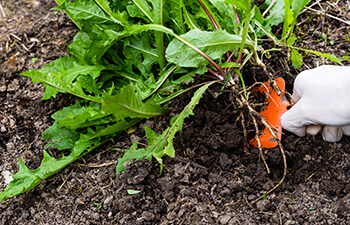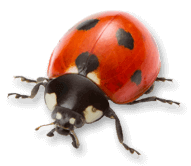

Manage Weeds Naturally
Healthy soil. Good soil grows healthy, vigorous plants. Healthy plants crowd out weeds. Weeds are easier to pull in healthy soil.
Get to know your soil. Some weeds prefer poor draining soil, some prefer it compacted, some need acidic conditions, and others thrive in low-nutrient areas. If you test your soil, you can learn how to improve your soil to help your plants outcompete the weeds!
Use mulch. A thick layer of mulch is your best defense against weeds. Mulch helps cover weed seeds, preventing them from germinating. Keep a few inches of bare space around stems and crowns of plants to prevent diseases.
Compost improves soil structure. Add it on top or mix it in, though be sure to test your organic matter percentage beforehand to see if more compost would help your soil (5% organic matter is best).
Grow a healthy lawn. Sunlight, healthy soil, proper watering and drainage are important for healthy grass. Thick, vigorous turf will shade out most weeds. See Natural Yard Care for tips to grow a great lawn!
Allow a few weeds in your lawn. Many "weeds", like clover or daisies, improve the soil, feed pollinators and add interest.
Grow a multilayered garden. A variety of plants will shade the ground in garden beds. Without sun fewer weeds will sprout, and any that do will be less noticeable.
Use weeding tools. Tools are safer than herbicides and hand weeding doesn’t harm other plantings. Tools won’t poison you or pollute rivers and streams.
Use heat to manage weeds. Weed burning torches are especially useful on patios and paths. Pouring boiling water on germinating weeds will kill many weed species.
Do your research. Dandelion and Himalayan Blackberry are not the same. Read up about the life cycles of weeds to find out the best time to intervene. Also, learn which are considered Noxious Weeds in your area. Most noxious weed control boards have plenty of less-toxic information to share about controlling some of the more invasive species.
Weed and feed is a pesticide!
Weed and feed contains weed-killing chemicals along with fertilizer. Spreading it over the whole lawn wastes money and risks harming people, pets, wildlife, groundwater and local rivers and streams.
If you decide to use a pesticide, pick a safer product for people, pollinators and the environment by using the product rankings in the Grow Smart, Grow Safe product tables.
